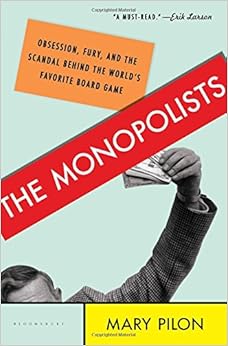I'd had this on my list to read, and then I was listening to the podcast 99% Invisible, and the author was interviewed for the show, and I figured the whole story was just about given away. After all, she went into pretty good detail regarding the origin and histories of the game of Monopoly, something I knew just a bit about.
As it turns out, however, the podcast merely skimmed the surface. Another good chunk of this book is about a court case--and about trademark (in addition to copyright and patents) and what it means for inventors and businesses. As such, this book becomes much more than a history. It becomes a kind of polemic, one that will invest you emotionally and will make you a bit angry. You'll cheer the little guy here, which is to say that on one level, this book focuses more on the disadvantages of trademark than the advantages, on the way trademark stifles innovation and small business. My wife, by contrast, pointed out to me that trademark actually protects the little people, and she has a point. There are usually two ways to look at things. No one would want to go into a store and buy a Gucci handbag and then have it fall apart two weeks later (because it wasn't really Gucci); in this sense, trademark protects the consumer. We know when we buy a brand or product that we are actually getting what we have purchased, and if someone tries to get around that trademark, that person will be punished, eventually, so that counterfeiting is discouraged.
But I like a book to rile me up, and this one did. The history part becomes part of the recounting of the lawsuit. The game essentially arose like this: a certain woman named Lizzie Magie created a board game to promote the economic theories of Henry George. That theory essentially promoted a single tax system--a property tax. That way, in theory, excessive landowning would be discouraged, and landlords would not be able to charge exorbitant rents for lousy properties. It was a game intended to show the evils of capitalism; it was called The Landlords Game. One could play it in two ways, one with a single tax system wherein players ended up working harmoniously or one in a monopolistic way wherein people tried to take advantage of each other. The latter, of course, is what won out.
Her game won little notoriety, but people did play it--and copy it--and change it. Games such as Finance and Inflation all played with similar ideas and concepts. A game very much like Monopoly found form among Quakers in Pennsylvania. Enter Charles Darrow. He plays the game at someone's house one night, then asks that person to write up the rules for him. He hires a professional designer to draw up some pictures and make the components pretty. He then begins selling the work as his own, until finally he sells it to Parker Brothers for big dollars, plus residuals. He claims the game as his own creation. Parker Brothers buys up as many patents of similar games as it can in order to better stake a claim to the rights to Monopoly. Magie gets a whopping five hundred dollars.
Parker Brothers does this because it had been burned in the past. Tiddly Winks and Ping-Pong (formally called Table Tennis) being two games that they invested in and marketed heavily only to see those games be considered public domain. So it has good reason to hold its rights to Monopoly closely.
That's the history part. The court case part considers one Robert Anspach, who creates a game for similar reasons as Magie created hers: to show the evils of capitalism--or rather the evils of monopoly. He calls his game Bust the Trust, but no one knows what a trust is, so he changes the name to Anti-Monopoly and sales begin to take off. Enter Parker Brothers, who claim that Anspach has ripped off their trademark. The rest of the story follows the next ten years of Anspach's life as he goes through hell to defend his right to sell and market his creation. There are surprises along the way, so I won't go deeper into the story than that. Suffice it to say that there's a lot of irony in the story: a game about fighting monopolies that becomes, in a sense, the subject of an intense fight over a monopoly. And in the end, the result is the monopolists and trademark advocates get stronger measures in Congress to defend themselves, lest other people like Anspach come along and create problems for big business. This is the part that really makes one feel angry--how much money really seems to matter in terms of the creation of our laws.
Subscribe to:
Post Comments (Atom)







No comments:
Post a Comment